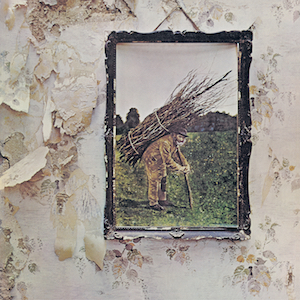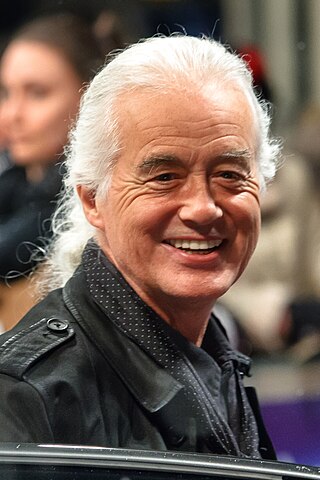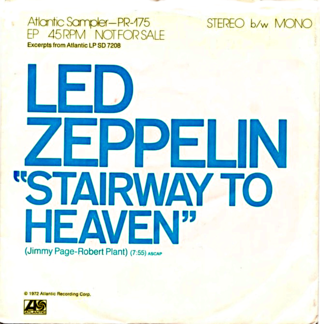
Led Zeppelin were an English rock band formed in London in 1968. The band comprised Robert Plant (vocals), Jimmy Page (guitar), John Paul Jones and John Bonham (drums). With a heavy, guitar-driven sound and drawing from influences including blues and folk music, Led Zeppelin are cited as a progenitor of hard rock and heavy metal. They significantly influenced the music industry, particularly the development of album-oriented rock and stadium rock.

Led Zeppelin is the debut studio album by English rock band Led Zeppelin. It was released on 13 January 1969 in the United States and on 31 March 1969 in the United Kingdom by Atlantic Records.

The untitled fourth studio album by the English rock band Led Zeppelin, commonly known as Led Zeppelin IV, was released on 8 November 1971 by Atlantic Records. Produced by the band's guitarist, Jimmy Page, it was recorded between December 1970 and February 1971, mostly in the country house Headley Grange. The album contains the band's most well-known recording, the eight-minute-long "Stairway to Heaven".

John Paul Jones, is an English musician, songwriter, and record producer who was the bassist and keyboardist for the rock band Led Zeppelin. Prior to forming the band with Jimmy Page in 1968, he was a session musician and arranger. After the death of drummer John Bonham in 1980, Led Zeppelin disbanded, and Jones developed a solo career. He has collaborated with musicians across a variety of genres, including the supergroup Them Crooked Vultures with Dave Grohl, Josh Homme, and Alain Johannes. He was inducted into the Rock and Roll Hall of Fame in 1995 as a member of Led Zeppelin.

Robert Anthony Plant is an English singer and songwriter. He was the lead singer and lyricist of the rock band Led Zeppelin from its founding in 1968 until their breakup in 1980; since then he has had a successful solo career, sometimes collaborating with other artists such as Alison Krauss. Regarded by many as one of the greatest singers in rock music, he is known for his flamboyant persona and raw stage performances.

James Patrick Page is an English musician and producer who achieved international success as the guitarist and founder of the rock band Led Zeppelin. Prolific in creating guitar riffs, Page’s style involves various alternative guitar tunings and melodic solos, coupled with aggressive, distorted guitar tones. It is also characterized by his folk and eastern-influenced acoustic work. He is notable for occasionally playing his guitar with a cello bow to create a droning sound texture to the music.
"The Battle of Evermore" is a folk duet sung by Robert Plant and Sandy Denny, included on Led Zeppelin's untitled 1971 album, commonly known as Led Zeppelin IV. The song's instrumentation features acoustic guitar and mandolin playing, while the lyrics allude to J. R. R. Tolkien's fantasy novel The Lord of the Rings.

"Stairway to Heaven" is a song by the English rock band Led Zeppelin, released on 8 November 1971 on the band's untitled fourth studio album, by Atlantic Records. Composed by the band's guitarist Jimmy Page with lyrics written by lead singer Robert Plant, it is widely regarded as one of the greatest rock songs of all time.

Peter Grant was an English music manager, best known as the manager of Led Zeppelin from their creation in 1968 to their breakup in 1980. With his intimidating size and weight, confrontational manner, knowledge and experience, Grant was able to procure strong and unprecedented deals for Led Zeppelin, and is widely credited with improving pay and conditions for all musicians in dealings with concert promoters. Grant has been described as "one of the shrewdest and most ruthless managers in rock history".
Richard Cole was an English music manager, who was involved in the rock music business from the mid-1960s to 2003. He is most known for having been the tour manager of English rock band Led Zeppelin from 1968 to 1980.
"The Song Remains the Same" is a song by the English rock group Led Zeppelin. It is the opening track from their 1973 album, Houses of the Holy.

Led Zeppelin's 1977 North American Tour was the eleventh and final concert tour of North America by the English rock band. The tour was divided into three legs, with performances commencing on 1 April and concluding on 24 July 1977. The tour was originally intended to finish on 13 August, but was cut short following the death of Robert Plant's son.

Led Zeppelin's 1973 North American Tour was the ninth concert tour of North America by the English rock band. The tour was divided into two legs, with performances commencing on 4 May and concluding on 29 July 1973. Rehearsals took place at Old Street Film Studios in London.

Led Zeppelin's 1968/1969 tour of North America was the first concert tour of the United States and Canada by the English rock band. The tour commenced on 26 December 1968 and concluded on 16 February 1969. It was important for the band, as their popularity grew substantially because of the concerts and helped them reach significant commercial success in the US, which translated to sales elsewhere.

The English rock band Led Zeppelin staged a concert tour of Denmark and Sweden in September 1968. The shows marked the band's first concert tour, though they were billed under the name "the Yardbirds".

The Ahmet Ertegun Tribute Concert was a benefit concert held in memory of music executive Ahmet Ertegün at the O2 Arena in London on 10 December 2007. The headline act was the English rock band Led Zeppelin, who performed their first full-length concert for almost three decades, since the death of drummer John Bonham in 1980, in a one-off reunion. Bonham's son Jason Bonham played drums during the band's set, and also provided backing vocals on two songs.

Stairway to Heaven: Led Zeppelin Uncensored is a book written by Richard Cole who was the tour manager for English rock band Led Zeppelin, from their first US tour in 1968 to 1979, when he was replaced by Phil Carlo. The book was co-written with Richard Trubo, a syndicated journalist, and was first published in August 1992.

Caesar's Chariot was a Boeing 720 passenger jet which was chartered by English rock band Led Zeppelin for their 1977 concert tour of North America.

In Through the Out Door is the eighth studio album by the English rock band Led Zeppelin. It was recorded in three weeks in November and December 1978 at ABBA's Polar Studios in Stockholm, Sweden, and released by their label Swan Song Records on 22 August 1979 in the US and 24 August 1979 in the UK. Unlike earlier Led Zeppelin albums, In Through the Out Door was dominated musically by bassist and keyboardist John Paul Jones. It was the band's last release before the death of their drummer John Bonham in September 1980 and their disbandment three months later.
















